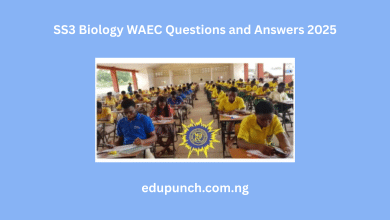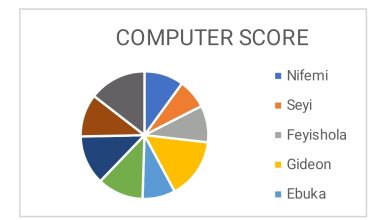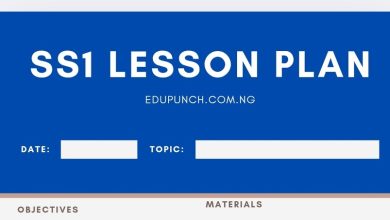SS2 English Language Scheme of Work- First Term

SS2 English Language Scheme of Work- First Term. This scheme of work covers grammar, comprehension, vocabulary, and tests of oral and written skills. Perfect for teachers, students, and curriculum planners seeking structured learning goals and weekly breakdowns.
Why stress yourself by typing lesson plans and notes when we have a comprehensive scheme, notes, and lesson plans here? Contact us to get schemes and notes on English and other subjects.
| Week | Topic | Objectives |
| 1 | Welcome test;
Revision: grammar: nominalization of adjectives and verbs |
1. Analyze nominalization of adjectives and verbs;
2. Describe the process of nominalization of adjectives and verbs. 3. Convert or transform adjectives and verbs into nouns. |
| Oral: consonant sounds | 1. Classify all twenty-four consonant sounds in English into voiced and voiceless consonant sounds;
2. Contrast consonant sounds with copious examples; 3. Produce consonant sounds correctly |
|
| Summary | 1. Explain what summary is;
2. Outline features of summary; 3. Outline the dos and don’ts of summary; 4. Summarise a given passage.
|
|
| 2 | Oral: consonant clusters
-cluster of two consonants -cluster of three consonants -cluster of four consonants |
1. Explain what a consonant cluster is;
2. Identify a consonant cluster or consonant clusters in any given word; 3. Analyze consonant clusters with regard to their places of occurrence in words. |
| Vocabulary development/ comprehension: words associated with the human body system and functions | 1. Identify words that are associated with human body system;
2. Generate sentences that contain those words; 3. Enumerate the functions of each of the words. |
|
| Writing/Expository: controlling HIV/AIDS in Nigeria or managing population explosion in Nigeria. | 1. Explain what an expository essay is;
2. Discuss HIV/AIDS or population explosion; 3. Discuss how to control HIV/AIDS or population explosion in Nigeria; 4. Write an expository essay on: How to control HIV/AIDS in Nigeria or How to manage population |
|
| 3 | Structure: nouns and noun phrase | 1. Explain what nouns are;
2. Analyse different types of nouns; 3. Distinguish a noun phrase from a noun clause; 4. Outline the functions of noun phrases in different sentences |
| Oral: transcription
Monosyllable words Bi/di syllable words Polysyllable words |
1. Transcribe any given word;
2. Pronounce transcribed words; 3. Generate copious examples of monosyllable/disyllable/polysyllable words |
|
| Vocabulary development/comprehension: words associated with health | 1. Outline words associated with health;
2. Explain the meaning of the words; 3. Use each of the words appropriately. |
|
| 4 | Structure: pronouns- types | 1. Analyse different types of pronouns;
2. Discuss the functions of different types of pronouns; 3. Use pronouns in different sentences. |
| Summary: Reading to summarize | 1. Explain what a summary is;
2. Discuss steps in summary writing; 3. Enumerate the dos and don’ts of summary writing; 4. Summarise given passages appropriately. |
|
| Vocabulary development/comprehension: words associated with building and building construction | 1. Specify words that are associated with building and building construction;
2. Discuss the functions of each of the words; 3. Use each of the words appropriately. |
|
| 5 | Oral: stress
Word stress Two, three, four, five, six syllable words |
1. Explain the meanings of syllable and stress;
2. Identify two, three, four, five, six syllable words; 3. Pronounce any given word appropriately. |
| Comprehension: listening to answer questions on a passage | 1. Enumerate listening skills;
2. Distinguish between listening and hearing; 3. Listen to any speech and answer questions on it. |
|
| Writing: argumentative – Should female circumcision be abolished Or Military rule is better than civil rule | 1. Distinguish argumentative essay from other essays;
2. Specify the vocatives of a debate; 3. Enumerate the feature of an argumentative essay; 4. Write an argumentative essay on any given topic. |
|
| 6 | Structure: plural forms of nouns; | 1. Discuss singular and plural forms of noun;
2. Analyse the formation of plurals; 3. Discuss the formation of plural compound nouns; 4. Use plural nouns correctly in speech. |
| Comprehension (reading to extract main points from aa passage)
(ii) summary |
1. Read any given passage and extract the main points from it;
2. Distinguish between topic sentence and supporting details; 3. Summarize any given passage. |
|
| Oral: stress
– Stress pattern (rules guiding the placement of stress in two or more syllable words) |
1. Analyse different stress pattern;
2. Discuss the rules guiding the placement of stress in words; 3. Pronounce any given word correctly. |
|
| 7 | Mid-term Break | |
| 8 | Comprehension: (reading a selected passage and make notes) | 1. Read any given passage;
2. Make notes on any given passage; 3. Enumerate the main points of any given passage. |
| Oral: emphatic stress | 1. Explain what emphatic stress is;
2. Specify the focus of any given passage; 3. Attempt questions on emphatic stress. |
|
| Summary: reading to summarize an argument | 1. Read any given argumentative essay and highlight its main points;
2. Distinguish between the key points and the supporting details of any given argumentative essay; 3. Summarize any given passage without mindless lifting. |
|
| 9 | Structure: adverbs and adverbial phrases | 1. Explain adverbs and adverbial phrases;
2. Give examples of adverbs and adverbial phrases; 3. Enumerate the functions of adverbs and adverbial phrases in different sentences. |
| Vocabulary development: words associated with colour, smell, taste (adjectives) | 1. Specify the adjective or words associated with colour, smell and taste
2. Use any of given adjectives correctly in sentences. |
|
| Comprehension: (listening)
Identify the tone, purpose, figurative expression |
1. Identify the tone of any spoken message;
2. Identify the purpose of any spoken message 3. Identify the figurative expressions in any spoken message |
|
| Writing: report writing (scientific report writing) A report of an experiment carried out by a student or a laboratory report | 1. Discuss the format of a report writing;
2. State the features of a scientific report; 3. Write a report on an experiment carried out by a particular student. |
|
| 10 | Structure: Adjective phrases and clauses and functions | 1. Distinguish between adjectival phrases and adjectival clauses;
2. Identify and state the function of adjectival phrases or adjectival clauses in any given sentence |
| Oral: rhyme | 1. Explain the meaning of rhyme;
2. Identify the words that rhyme; 3. Describe the process of identifying words that rhyme. |
|
| Writing: creative writing
-Features of a short story or play – features of a poem |
1. Enumerate the techniques of creative writing;
2. Discuss the features of a short play or story; 3. Enumerate the features of a poem; 4. Write a short play, story or poem. |
|
| 11 | Structure: phrasal verbs with two particles | 1. Explain phrasal verbs;
2. Give copious examples of phrasal verbs; 3. Use phrasal verbs correctly in different sentences. |
| Comprehension (reading) reading to paraphrase poems or dramatic works | 1. Paraphrase any given poem or dramatic works;
2. Distinguish between key points and supporting points. |
|
| Letter writing: informal letter | 1. Explain the meaning of an informal letter;
2. Highlight the features of an informal letter; 3. Write the format of an informal letter; 4. Write a letter to a parent, friend, or brother |
|
| 12 | Structure: Adverbial clause | 1. Explain what an adverbial clause is in a given complex sentence;
2. Identify an adverbial clause in a given complex sentence; 3. State the function of an adverbial clauses in a given complex sentence. |
| Writing: narrative essay | 1. Explain what narrative essay is;
2. Discuss how to write a narrative essay; 3. Write a story |
|
| Summary writing | 1. Discuss how to summarize
2. Highlight the dos and don’ts of summary writing; 3. Summarize any given passage without mindless lifting. |





One Comment